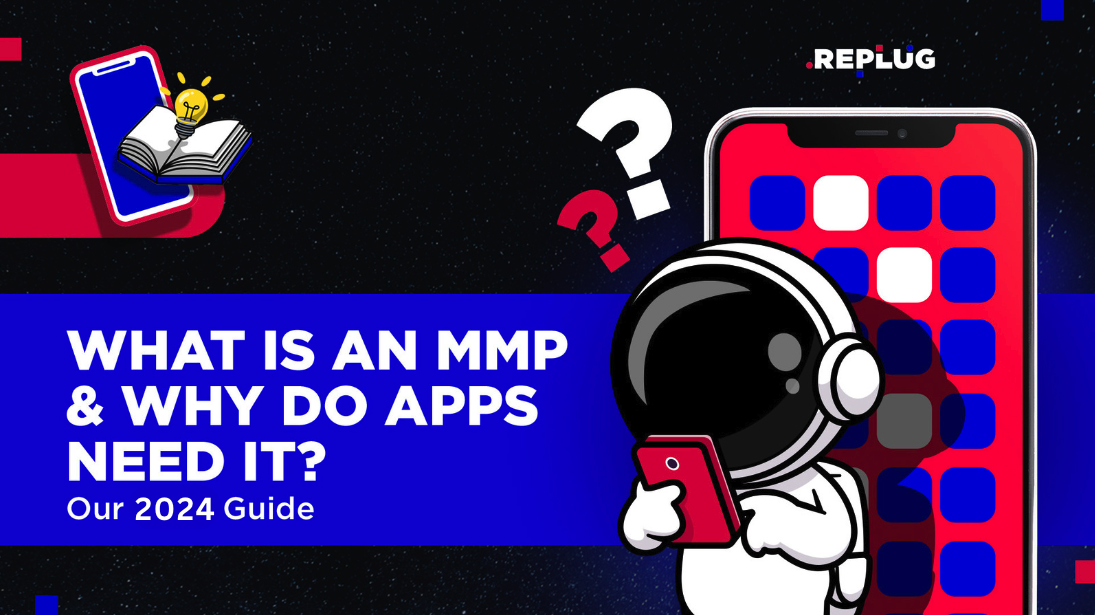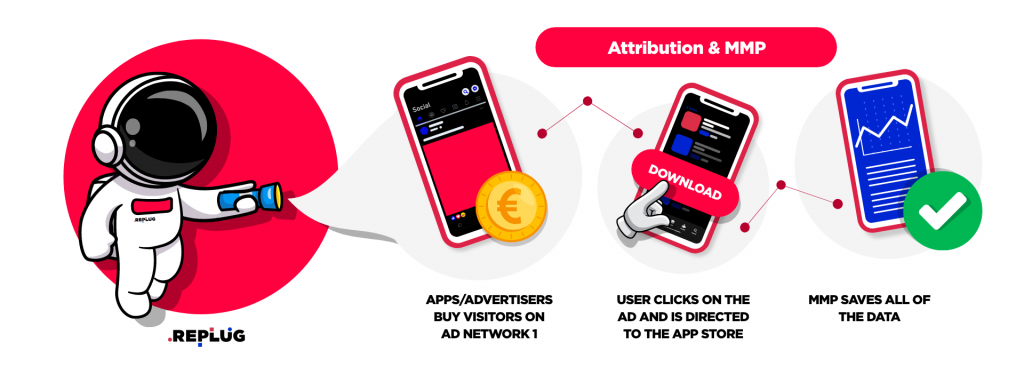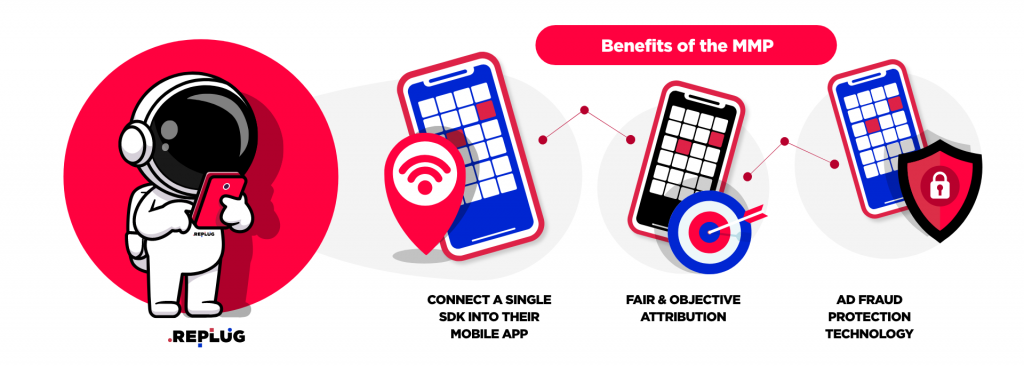What Is an MMP and Why Do Apps Need It? Our 2024 Guide

To scale a mobile app, you must start making data-driven decisions. And if you’ve wondered what is an MMP and why you need it, we have an in-depth article for you.
Table of Contents
- What Is an MMP?
- Five Main Benefits of MMP
- Things to Keep In Mind When Choosing Your MMP
- What Is an MMP and Why Do Apps Need It? By Now – You Know
- FAQ
Businesses must be prepared to meet consumer needs while balancing an inevitable return to regular tasks with an already altered digital experience. In addition, given the number of users, mobile strategies/activities are more appealing (and challenging) than ever.
That is where an MMP comes in to help.
Connecting a Mobile Measurement Partner to your app in 2024 enables you to track and optimize your data more efficiently. More on this topic is discussed below.
What Is an MMP?
MMP, or Mobile Measurement Partner, is a third-party tool that app marketers use to analyze the performance of their mobile advertising campaigns. In other words, MMP provides data on mobile campaign performance metrics such as app installs, engagement, clicks, revenue, and so on.
An MMP app essentially acts as a mobile attribution platform, allowing for effective MMP tracking and analysis.
Their primary responsibility is to attribute a mobile app install (and post-install events) to the origin from which it initially came. Therefore, because MMP displays which media platform tends to drive the most conversion, app marketers can analyze more precisely and make better spending relocation decisions.
How Does a Mobile Measurement Partner Work?
An MMP, in a nutshell, matches campaign engagements with installations and post-install in-app activities. You must configure a software development kit (SDK) within your app to operate with a Mobile Measurement Partner.
SDK is a unique code that gathers measurement and attribution data. As a result, once the user installs and launches the app, it begins obtaining data from the device on which it is implemented. This makes the MMP network integral to mobile marketing strategies.
Who Needs an MMP and Why?
Essentially, all marketers with an app need an MMP, as it is crucial for growth in their overall marketing efforts.
Moreover, the most data-rich advertising channel currently available is mobile. However, when it comes to evaluating campaign performance, the total volume of media data that must be examined can be daunting and difficult to assess.
If you’re not using an MMP, you might spend days on your laptop trying to organize all the spreadsheets and data manually. Trust us, this is neither a good nor an efficient approach.
Moreover, the above manual analysis is prone to mistakes and missed chances to improve LTV (lifetime value) and ROAS (return on ad spend).
Mobile attribution, when handled by an MMP, can pin down the value of particular media sources, channels, publishers, creatives, and campaigns, enabling you to continuously optimize your app’s performance while also ensuring strategic growth.
Download our free tracking and MMP setup checklist. Our expert consulting team worked hard on every single detail. Therefore, you will be 101% sure that you are on the right path.
How Does Attribution Work With an MMP?


Attribution enables marketers to learn where their customers are coming from. Some installs may emerge from video ads in an app, while others may show up from social media platforms.
In a nutshell, attribution determines whether a user installs an app after clicking/viewing an advertisement and then tracks how the user acts after installing the app.
Let’s see how attribution and MMP work together in steps through an example.
- Apps, or advertisers in this scenario, buy visitors on Ad Network 1, which further represents an ad to a user’s device.
- After becoming interested in the proposal, the user clicks on the ad and is directed to the App Store, where the user can (and, in this case, does) install the app.
- An MMP saves the necessary data from the network that delivered the ad to the creative and then sends it back to Ad Network 1, where the tap and install occurred.
Later in the process, networks claim the installs. It is very likely that more than one network claims the same install—that is where the MMP comes in and determines the real winner by assessing the last click that generated the install.
Attribution providers are not simply dependable data warehousing but also trustworthy partners in the ad system that keep things running.
Related: Mobile Measurement Partners: How to Ensure Correct AppsFlyer Integration
Five Main Benefits of MMP
Since we have covered almost everything in simple terms about Mobile Measurement Partners—from “What is an MMP?” to “How does attribution work with an MMP”—we wanted to reflect once more on the core definition and then list the three main benefits of an MMP.
MMPs are well recognized for their ability to assist customers in measuring and attributing conversions appropriately. Still, they also frequently provide other services that help marketers optimize their marketing strategy and outcomes.
Related: Guide: Settings for Correct Adjust Attribution
Okay, now that we have that part covered, let’s focus on the clear benefits.
- Integration Simplicity: They let an advertiser connect a single SDK (universal) to their mobile app instead of installing a different SDK for each ad network or publisher with whom they wish to run a campaign.
- Objective Attribution: They offer fair and objective attribution by serving as a single point of truth for marketers on which campaign ad caused a certain conversion.
- Ad Fraud Protection: They serve ad fraud protection technology that keeps marketers from losing precious ad spend due to fraudulent practices, including SDK spoofing, click injection, click spamming/flooding, install hijacking, ad stacking, bot traffic, and others.
- Cross-Network Campaign Management: As you grow campaigns across multiple ad networks, all of the tools you need to explore new networks are already in place.
- Data Reliability and Granularity: An MMP provides you with reliable and granular data, allowing you to allocate budgets and enhance the performance, ROAS, and LTV of your app.


Now, we also have to cover the topic—ATT framework and iOS 17—to see why such a useful tool (MMP) is also important in that field.
AppTrackingTransparency (ATT) Framework and iOS 17
MMPs continue to play a pivotal role in streamlining ad campaigns and aiding marketers to navigate through the shifting sands of the digital marketing landscape. The release of iOS 17 reinforces this trend, as Apple enhances its commitment to user privacy, building upon the foundation laid by the ATT framework introduced in iOS 14.5.
This advancement has prompted Mobile Measurement Partners to innovate and refine their attribution and measurement solutions, ensuring compliance with the heightened privacy norms under iOS 17.
Therefore, working with a Mobile Measurement Partner is more critical than ever (for those who are not aware of it yet) to guarantee you have the knowledge and tools you need to continue developing your business regardless of what changes take place in the adtech sector.
Things to Keep In Mind When Choosing Your MMP
On the market, there are several MMP choices. Depending on the needs of the developers, one solution might be better suited than others. Generally speaking, however, the basic functionalities are similar. Some attribution platforms appeal to large corporations, while others are great for small and medium-sized businesses.
We wanted to highlight a few questions/points for you to remember when picking your perfect Mobile Measurement Partner. It will make your decision process a lot easier and faster.
1. First and Foremost: Privacy and Security
The given topic is crucial and should be addressed with utmost caution in the form of thorough and ongoing research processes with any vendor that has exposure to your most valuable resource—your users’ data.
You must explicitly ensure that your attribution partner is completely independent and neutral and that they are not exchanging your data as part of their company plan.
2. Knowledge and Experience
Expertise is more than simply an advantage. As with any critical component, collaborating with an experienced, dependable MMP is vital. Moreover, the mobile attribution system is complicated to set up and manage. It necessitates serious effort to construct a powerful, scalable, reliable, and accurate platform.
To make matters even more tricky, attribution platforms are, by nature, a delicate (complex) product. Therefore, any choice you make will have long-term consequences for your business, whether the result is good or bad.
3. Precision of Data
The MMP should give accurate and unbiased statistics because, based on this set of information, you will make a decision in your marketing activities. As a result, you must completely trust and rely on it.
What you can do here is check the organizations’ customer portfolios and rely on their opinions—also do your own in-depth research on the preferred company! Research is crucial in any part of the business, and here at REPLUG, we can’t stress that enough.
4. Anti-Fraud Tools
Examine the mobile attribution product’s anti-fraud tools again and be sure of it. Fraud is the downfall and enemy of the mobile ecosystem, and excellent weapons are required to combat it. As a result, while selecting an MMP, a trustworthy (reliable) anti-fraud tool is a must.
What Is an MMP and Why Do Apps Need It? By Now – You Know
So, here we are at the end of this journey. And what did we learn? By gathering click and impression information from advertising (ad) networks to perform attribution, an MMP assists marketers in acquiring and distributing mobile app data to provide a detailed understanding of their marketing efforts (campaigns).
MMPs are great because they serve as a single source of truthful information for marketers and offer new growth strategies.
To sum it up, assess your marketing objectives and make sure they correspond with the MMP you want to partner with when selecting one.
If you haven’t integrated an MMP in your mobile app yet or are looking for ways to improve your tracking attribution, get in touch with us, and one of our consultants will get back to you soon.
FAQ
Is Google Analytics an MMP?
No, it is not. Google Analytics is an excellent tool for web analytics and optimization in any business. Still, it is not a replacement or an alternative to autonomous MMPs such as AppsFlyer and Adjust.
What Does MMPs Mean in Marketing?
It refers to a platform that allows advertisers to track the success of their various advertising channels. The platform delivers data and insights that enable marketers to better understand where their marketing funds should be spent.
Why Do You Need an MMP?
All of your data from numerous networks and campaigns will be available on a single dashboard with an MMP. It is also much more straightforward to compare campaign results. An MMP provides vital insights on where to spend your budget and how to maximize your installs, LTV, and ROAS.
Originally published on November 4, 2022. Updated on December 1st, 2023.
